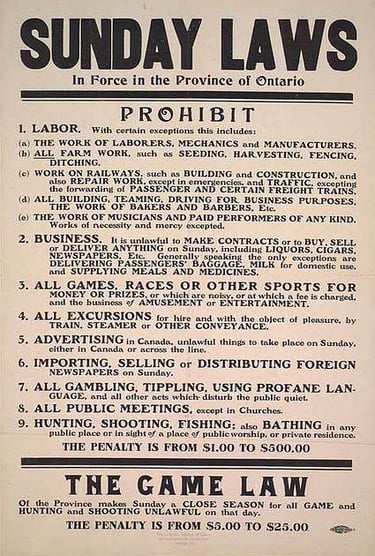The Genesis of Blue Laws: Morality and Early American Legislation
Early "Blue Laws" in the American colonies, particularly in Puritan New England, were civil statutes designed to regulate public morality and enforce religious observance, primarily on the Sabbath. These enforceable laws reflected the conviction that the state should ensure a godly society and that public order was tied to religious conformity. Their significance lies in demonstrating the strong link between religious belief and civil authority in early American society, emphasizing the state's role in legislating morality. Though their strict mandates have largely faded, their legacy endures in modern legal debates about church-state separation and governmental regulation of moral or commercial activities, with echoes seen in contemporary Sunday laws, often now with secular justifications.
The emergence of what became known as "Blue Laws" in the American colonies marked an early, explicit attempt to regulate public morality and enforce religious observance through civil legislation. Primarily prevalent in Puritan-dominated New England, these statutes dictated behavior on the Sabbath, prohibiting a wide range of activities including commerce, travel, public amusement, and even certain forms of labor. These laws were not merely suggestions but enforceable statutes, reflecting the conviction among early settlers that the state had a duty to ensure a godly society and that public order was inextricably linked to religious conformity. They provided a detailed framework for daily life, often extending beyond Sunday prohibitions to regulate personal conduct and social norms.
The significance of these early legislative efforts lies in their demonstration of the powerful intersection between religious conviction and civil authority in the foundational years of a new society. They underscored a prevailing belief that the state could, and should, legislate morality for the common good and spiritual well-being of its citizens. While the specific, stringent mandates of the original Blue Laws have largely faded from direct application, their legacy for modern law is evident in ongoing debates regarding the separation of church and state, and the permissible extent of governmental regulation over private moral choices or commercial activity. Echoes of these laws can still be found in contemporary regulations concerning Sunday trading hours or alcohol sales, illustrating how historical attempts to codify social values continue to influence the legal landscape, albeit often with secular justifications now replacing their original religious underpinnings.


